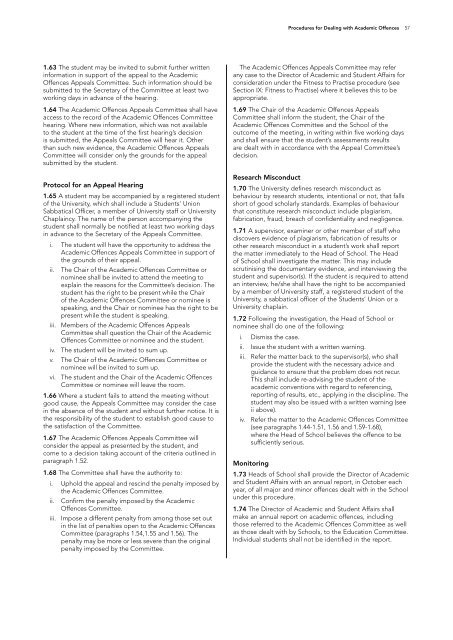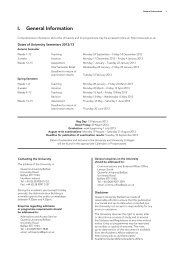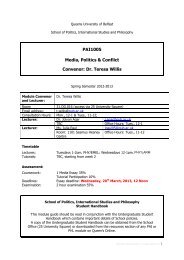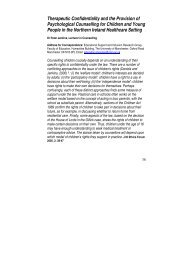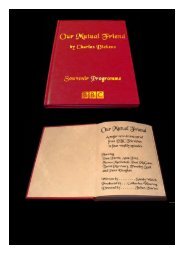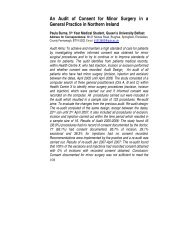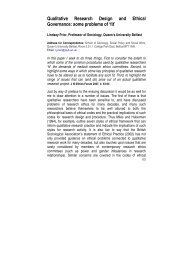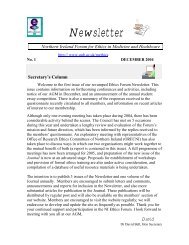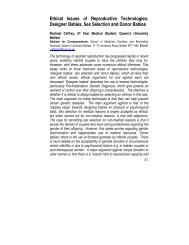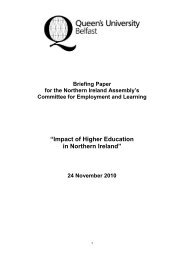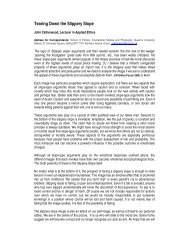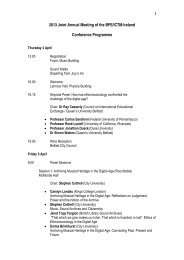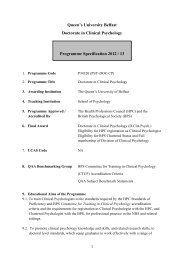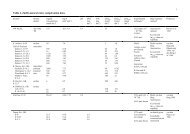University Calendar for Postgraduate Students 2012/13 - Queen's ...
University Calendar for Postgraduate Students 2012/13 - Queen's ...
University Calendar for Postgraduate Students 2012/13 - Queen's ...
You also want an ePaper? Increase the reach of your titles
YUMPU automatically turns print PDFs into web optimized ePapers that Google loves.
Procedures <strong>for</strong> Dealing with Academic Offences 57<br />
1.63 The student may be invited to submit further written<br />
in<strong>for</strong>mation in support of the appeal to the Academic<br />
Offences Appeals Committee. Such in<strong>for</strong>mation should be<br />
submitted to the Secretary of the Committee at least two<br />
working days in advance of the hearing.<br />
1.64 The Academic Offences Appeals Committee shall have<br />
access to the record of the Academic Offences Committee<br />
hearing. Where new in<strong>for</strong>mation, which was not available<br />
to the student at the time of the first hearing’s decision<br />
is submitted, the Appeals Committee will hear it. Other<br />
than such new evidence, the Academic Offences Appeals<br />
Committee will consider only the grounds <strong>for</strong> the appeal<br />
submitted by the student.<br />
Protocol <strong>for</strong> an Appeal Hearing<br />
1.65 A student may be accompanied by a registered student<br />
of the <strong>University</strong>, which shall include a <strong>Students</strong>’ Union<br />
Sabbatical Officer, a member of <strong>University</strong> staff or <strong>University</strong><br />
Chaplaincy. The name of the person accompanying the<br />
student shall normally be notified at least two working days<br />
in advance to the Secretary of the Appeals Committee.<br />
i. The student will have the opportunity to address the<br />
Academic Offences Appeals Committee in support of<br />
the grounds of their appeal.<br />
ii.<br />
The Chair of the Academic Offences Committee or<br />
nominee shall be invited to attend the meeting to<br />
explain the reasons <strong>for</strong> the Committee’s decision. The<br />
student has the right to be present while the Chair<br />
of the Academic Offences Committee or nominee is<br />
speaking, and the Chair or nominee has the right to be<br />
present while the student is speaking.<br />
iii. Members of the Academic Offences Appeals<br />
Committee shall question the Chair of the Academic<br />
Offences Committee or nominee and the student.<br />
iv. The student will be invited to sum up.<br />
v. The Chair of the Academic Offences Committee or<br />
nominee will be invited to sum up.<br />
vi. The student and the Chair of the Academic Offences<br />
Committee or nominee will leave the room.<br />
1.66 Where a student fails to attend the meeting without<br />
good cause, the Appeals Committee may consider the case<br />
in the absence of the student and without further notice. It is<br />
the responsibility of the student to establish good cause to<br />
the satisfaction of the Committee.<br />
1.67 The Academic Offences Appeals Committee will<br />
consider the appeal as presented by the student, and<br />
come to a decision taking account of the criteria outlined in<br />
paragraph 1.52.<br />
1.68 The Committee shall have the authority to:<br />
i. Uphold the appeal and rescind the penalty imposed by<br />
the Academic Offences Committee.<br />
ii.<br />
Confirm the penalty imposed by the Academic<br />
Offences Committee.<br />
iii. Impose a different penalty from among those set out<br />
in the list of penalties open to the Academic Offences<br />
Committee (paragraphs 1.54,1.55 and 1.56). The<br />
penalty may be more or less severe than the original<br />
penalty imposed by the Committee.<br />
The Academic Offences Appeals Committee may refer<br />
any case to the Director of Academic and Student Affairs <strong>for</strong><br />
consideration under the Fitness to Practise procedure (see<br />
Section IX: Fitness to Practise) where it believes this to be<br />
appropriate.<br />
1.69 The Chair of the Academic Offences Appeals<br />
Committee shall in<strong>for</strong>m the student, the Chair of the<br />
Academic Offences Committee and the School of the<br />
outcome of the meeting, in writing within five working days<br />
and shall ensure that the student’s assessments results<br />
are dealt with in accordance with the Appeal Committee’s<br />
decision.<br />
Research Misconduct<br />
1.70 The <strong>University</strong> defines research misconduct as<br />
behaviour by research students, intentional or not, that falls<br />
short of good scholarly standards. Examples of behaviour<br />
that constitute research misconduct include plagiarism,<br />
fabrication, fraud, breach of confidentiality and negligence.<br />
1.71 A supervisor, examiner or other member of staff who<br />
discovers evidence of plagiarism, fabrication of results or<br />
other research misconduct in a student’s work shall report<br />
the matter immediately to the Head of School. The Head<br />
of School shall investigate the matter. This may include<br />
scrutinising the documentary evidence, and interviewing the<br />
student and supervisor(s). If the student is required to attend<br />
an interview, he/she shall have the right to be accompanied<br />
by a member of <strong>University</strong> staff, a registered student of the<br />
<strong>University</strong>, a sabbatical officer of the <strong>Students</strong>’ Union or a<br />
<strong>University</strong> chaplain.<br />
1.72 Following the investigation, the Head of School or<br />
nominee shall do one of the following:<br />
i. Dismiss the case.<br />
ii. Issue the student with a written warning.<br />
iii. Refer the matter back to the supervisor(s), who shall<br />
provide the student with the necessary advice and<br />
guidance to ensure that the problem does not recur.<br />
This shall include re-advising the student of the<br />
academic conventions with regard to referencing,<br />
reporting of results, etc., applying in the discipline. The<br />
student may also be issued with a written warning (see<br />
ii above).<br />
iv. Refer the matter to the Academic Offences Committee<br />
(see paragraphs 1.44-1.51, 1.56 and 1.59-1.68),<br />
where the Head of School believes the offence to be<br />
sufficiently serious.<br />
Monitoring<br />
1.73 Heads of School shall provide the Director of Academic<br />
and Student Affairs with an annual report, in October each<br />
year, of all major and minor offences dealt with in the School<br />
under this procedure.<br />
1.74 The Director of Academic and Student Affairs shall<br />
make an annual report on academic offences, including<br />
those referred to the Academic Offences Committee as well<br />
as those dealt with by Schools, to the Education Committee.<br />
Individual students shall not be identified in the report.


